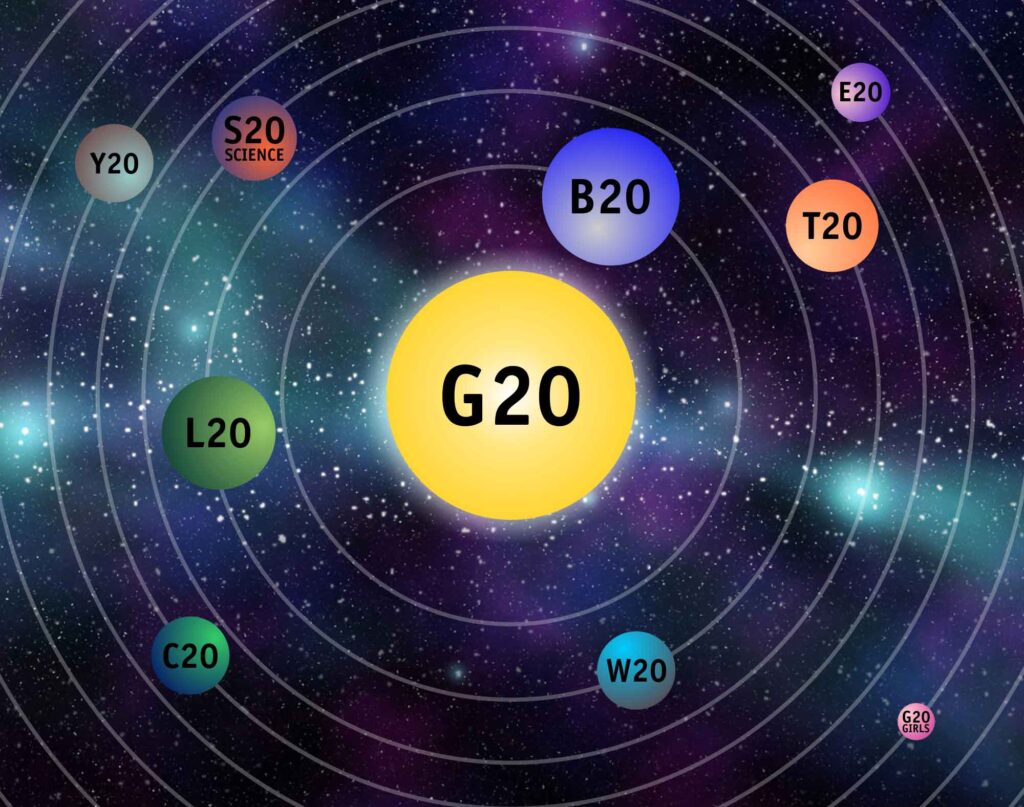A few words
Women20 (W20) history
Women20 (W20) is the official advisory group set up by the G20 to advise on steps to the economic empowerment of women and girls
Who are Women20?
Women20 (W20) was founded by the G20 with the long term aim of reducing the gender employment gap by 25 percent by 2025 as agreed in the G20 2014 Summit in Brisbane, Australia, often referred to as the Brisbane Agreement. In October 2015 the first working group meeting was held in Turkey under the G20 Turkish Presidency year. The W20 provides specific recommendations for action, consolidated advocacy and expertise to the G20 Member States. These joint recommendations are drawn up by representatives of women’s and social organizations, women entrepreneurs and female economic experts from G20 countries and international organizations from around the world. The aim is to permanently mainstream women’s economic participation and empowerment in G20 objectives and to support existing political declarations, including the UN’s Agenda 2030. Members of the W20 are official appointees and called “Delegates”. W20 initiative topics have continued and been explanded. These are labour force participation and equality of pay and leadership, access to the capital markets and finance, closing the digital gender divide and entrepreneurship. In later years climate change, gender health and violence against women and girls were added.
- 2026 – USA Presidency
- 2025 – South African Presidency
- 2024 - Brazil Presidency
- 2023 - Indian Presidency
- 2022 - Indonesian Presidency
- 2021 - Italian Presidency
- 2020 - Saudi Arabian Presidency
- 2019 - Argentinian Presidency
- 2018 - Japanese Presidency
- 2017 - German Presidency
- 2016 - Chinese Presidency
- 2015 - We first started our work during the Turkish Presidency
Who is the G20?
The Group of Twenty (G20) is the main international forum for economic cooperation and decision making globally. The G20 membership consists of 19 countries plus the European Union. The G20 meets each year and the G20 Presidency rotates countries. The current year’s G20 Presidency will also invite several guest countries to participate in meetings. The G20 comprises 19 countries (Argentina, Australia, Brazil, Canada, China, France, Germany, India, Indonesia, Italy, Japan, Republic of Korea, Mexico, Russia, Saudi Arabia, South Africa, Türkiye, United Kingdom and United States) and the European Union. The G20 members represent around 85% of the global GDP, over 75% of the global trade, and about two-thirds of the world population and what is done in these countries can dramatically affect the remaining 15%.
G20 leaders meet annually. In addition, Finance Ministers and Central Bank Governors meet regularly during the year to discuss ways to strengthen the global economy, reform international financial institutions, improve financial regulation and implement the key economic reforms that are needed in each member economy. Underpinning these meetings is a year-long program of meetings among senior officials and consisting of working groups coordinating policy on specific issues.
The G20 began after the Asian financial crisis in 2008, and the first G20 Leaders’ Summit played a key role in responding to the global financial crisis. The G20 focus is to drive practical actions that will lead to sustained global growth. The G20 is supported by international organisations, including the Financial Stability Board, the International Labour Organisation, the International Monetary Fund, the Organisation for Economic Co-operation and Development, the United Nations, the World Bank and the World Trade Organization. These and several other organisations are invited to attend key G20 meetings.
G20 has several engagement groups in addition to W20. These are B20 (Large businesses), C20 (Civil Society), L20 (Labour Organisations), T20 (Think Tank Organisations) and Y20 (Youth Organisations).
Achievements
- Launch of W20 by G20 putting Gender Equality at the core of the G20 nations
- Joint statements issued with C20, B20, Y20, L20, S20 on skills, labour gaps, education and more
- Call made to the G20 for action on gender equality in response to the COVID Pandemic in 2020
- Many regional Presidency meetings to engage the community of men and women and educate on gender equality for economic growth
- Gender Medicine, Climate Change and Violence Against Women and Girls added to our work
- The Roadmap of Rome 2021 towards gender equity was included in the G20 Leaders' Declaration
- The launch of WeACT to action Women's Entrepreneurial initiatives within the G20 nations in topics from procurement to finance in 2021.
- The launch of our the first W20 Knowledge Hub to hold all our working documents in one place in 2022.
- The launch of our first W20 Website in New Year 2023 for all 20 nations to show Women20 legacy and evidence our hard work on an ongoing basis year on year towards equality by 2050.
Source: HEINRICH BOLL STIFTUNG

